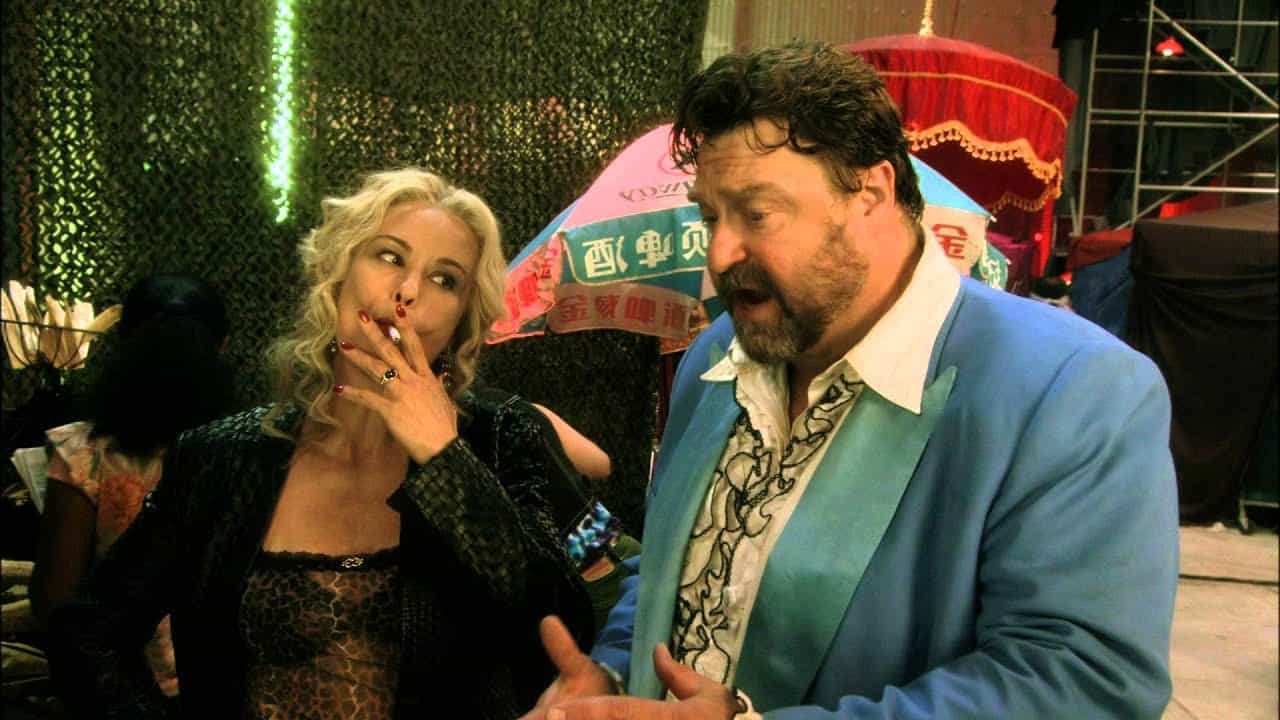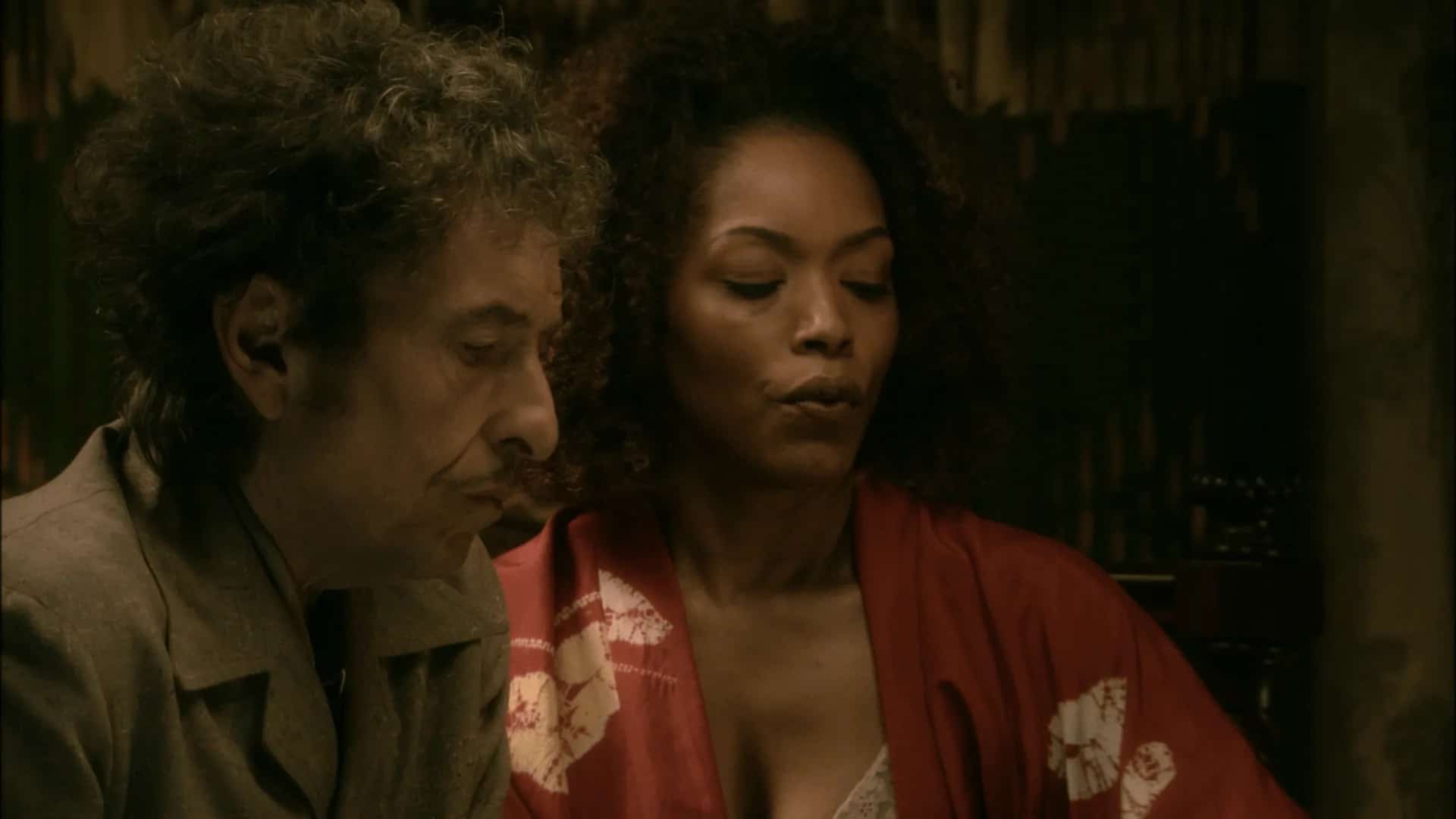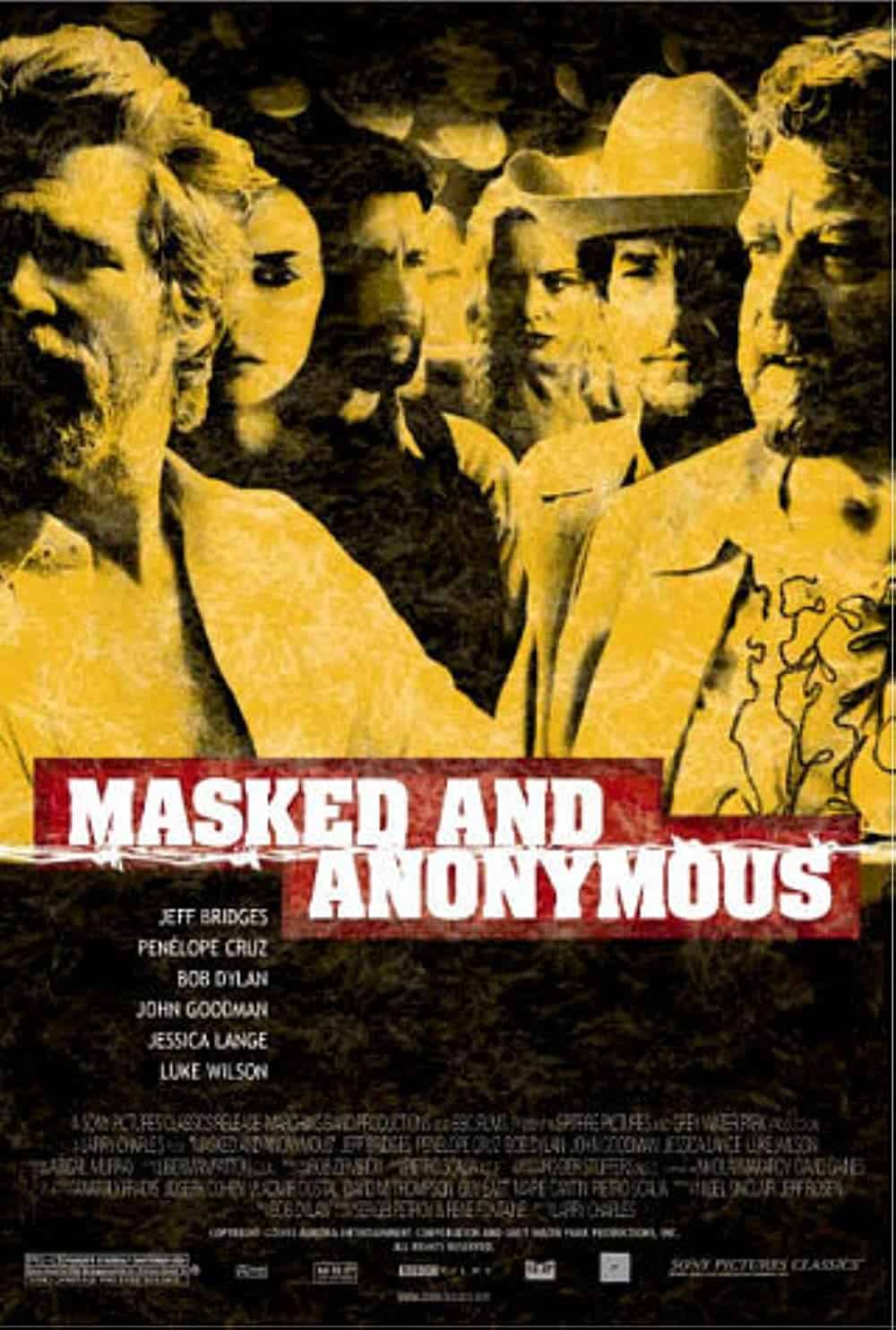Patricia Highsmash
Movie Bob Dylan: Masked and Anonymous
by Travis Hedge Coke
“Are you gentlemen aware that this is all a play?” A character (played by John Goodman) says something like this, almost immediately, to walk us in.
“Are you humble before god?” asks a radio personality (voiced by director and co-writer, Larry Charles) as we come in.
Masked and Anonymous, with its political coups and social cues and whistle stop gags, exists because a former Traveling Wilbury and a writer for television’s Seinfeld were about to do a comedy revue for HBO, and then they did not do it. Replaced with a ensemble about Los Angeles, a fugacity play in which America loses a present and gains another, in which a man dressed like the private Bob Dylan stands behind Bob Dylan dressed like a stage Bob Dylan looks at the other Bob Dylan in the same mirror into which he looks back at him.
Anonymous, a film featuring Angela Bassett, knows that using famous voices, famous faces, name actors will give us something to keep watching; to keep listening to. We listen no matter how absurd or abstract the dialogue becomes, because it is that famous actor, it is that other famous actor. Because it is a “Bob Dylan movie“ we are primed to accept absurdity, science-fiction, fantastical possibilities as entirely little literal and entirely possible. When someone says maybe some angels got together to release Jack Fate (Bob Dylan) from prison, we accept that it may literally be some angels. When Jack Fate and Prospero (Cheech Marin) talk about an eagle killing a pregnant rabbit, Prospero says the rabbit must have done something, and we are primed to accept the possibility that this is sardonic, this is ironic or sarcastic.

As characters speculate about one of the many Bob Dylan songs performed or played throughout Masked and Anonymous, it is floated that the song is about being evil, “written from Hyde’s point of view.” Not out of expediency necessarily or out of a poetic irony, but by the tools at hand, we try to kill our conscience. What song? Could be any song.
Bob Dylan is whoever you mistake him to be, and sometimes that is Agamemnon and sometimes that is Aeschylus. Sometimes, it is a has been folk singer called Jack Fate who is probably a nepotism hire.
As Jack Fate is carted away, under arrest, in the back seat, Blowing in the Wind plays as if he can hear it, applause from a live audience for him. Nested dolls or just a wink. It is winking all the way in.
Dixie becomes a protest song by context and intent. Whether context and intent are enough to justify or carry a tune.
“Doing evil and trying to kill your conscience if you can.”
“Doing good by manipulating the forces of evil.”
During the film, Fate has visions of this assassinated minstrel, Oscar Vogel, wearing black face, and it one point substituted by a Black, living, janitor. What politics? Could be any.
Every face in Masked and Anonymous is recognizable, each name full of surmise that we put there, and everything crafted. Crafted. Crafted into what could be parables or simply set pieces, comedy sketches, concert vignettes, without ever getting us the hook along with the bait.
It is up to us to set our reception. It is up to us whether or not we join the reception. What’s the tableau, what’s the smorgasbord, what the review is… Maybe it is what Delroy Lindo, playing a network head honcho, intends. Maybe it is what the producer, played by Jessica Lange, intends. Or, Bob Dylan’s Jack Fate, or the twin devils, the two Satans, the journalist, Tom Friend, played by Jeff Bridges, and his editor, portrayed by Bruce Dern. Maybe it is the writers and directors of the film, who goes under aliases, but which we know are former Mad About You writer, Larry Charles and Bob Dylan, song and dance man.
Jack Fate understands how much his father, the President of the United States and now dying, and the Vice President, Fate’s spiritual brother who is ascending to the throne, hate minstrelsy. A banjo-player in makeup, a minstrel (Oscar Vogel, played by Ed Harris) who was Fate’s father’s favorite entertainer, spoke against Fate’s father during his presidency, and for that he was killed. So, when Fate is going to perform a benefit concert, having been recently released from prison to play the benefit concert, one of the songs he wants to play is Dixie. We see him rehearse it in the film.
Jack said can take a bus going in the wrong direction, get where he’s going, and have everything fall apart as part of the plan. If there is a plan, he does not let us in on it calls and we don’t know it. The parable could be, not in the movie, but us in our seats.
Main criticisms of Masked and Anonymous?
There are too many celebrities.
The movie moves too quickly for you to grasp what’s going on.
It is a vanity project.
It is the work of ego
That punch at the end looks super fake.
Many critics had difficulty with the location, the city in which Masked takes place, despite it being an undressed, an altered Los Angeles of their era. It appears war-torn, it appears a classist nightmare, there are homeless people, there is distraction, there is intensity and exasperation, because Los Angeles is a class nightmare full of exasperation, intensity homelessness, and war.
Masked and Anonymous is rarely criticized for its gender dynamics, it’s racial dynamics including black face and minstrelsy, it’s conflation or politics,. Central aspects of mast in anonymous is that what is negative in one generation, one culture, one moment, can be turned positive in another moment,. While we understand, and it is clear that in the past , minstrelsy and black face or negative, that they hurt innocent people, there is an attempt by characters in masked and anonymous return these two things to positive ends.
Maybe this is just the story of a musician being horny for his mother, but with that unavailable, and unacceptable, he has a fling with his father‘s lover, or maybe it is a political drama. Maybe that first thing is political drama. It might be the second, that the military coup on itself, comedy conquest of America by America, is incest and myth.
Mickey Rourke’s character, a mix of Dick Cheney and the cannibal president, Andrew Jackson, says he and Jack Fate are not just a couple macho men from the flea market but they are. As sure as Fate’s friend, Bobby Cupid is a too fast on the draw judgmental racist, they are. As sure as the van in the studio lot is rocking and they need no one to come knocking, they are.
Sometimes you die in debt, but how would you know?
The network wants the musician to play a particular set of songs, songs which are ostensibly about revolution (including the Beatles’ Revolution (“You know, the in and out version”), songs which have become so played, so commercial, so played out, that they have no revolt. Jailhouse Rock is about the warden throwing the prisoners a party and they all know it. The songs the musician and his band practice, a cover band who have have performed his songs while he was in prison, are songs they believe they will be playing at the concert. Songs which are not traditionally thought of as protest songs, as revolution songs, but which will attain a revolutionary era, which will inspire a revolutionary feeling, which protest something concrete and real, not because they are designed to protest, but because of how they are in this time and place, in this context, in this phase space, received.
The plot is not complicated. Some time ago, the president’s son, a musician, had a sexual relationship with his father’s mistress, and was thrown into prison. In the present, which is also the future, the musician is brought out of prison by a television network, to perform a benefit concert, which will help someone, although that someone is perpetually nebulous. During the rehearsals for the concert, the president dies, the vice president takes office, as the new president, and announces war that is already implicit, on everyone who the president feels is not acceptable, tolerable, or who the president feels, simply, can be abused. The concert is never broadcast. There is a killing near the stage. The musician takes the fall for the murder, blamed by someone simply irate at him, and is taken back to prison. The trick might lie in this not being a tragic ending.
There is no film. Masked and Anonymous was shot via digital cameras. It is released on digital media.
This is a film, a movie, with characters and with audience. The majority of the movie itself takes place on the back lot, under tents, in trailers, under lights, with speakers, new microphones, as they prepare for a broadcast, and while they are preparing, the very preparation, is the broadcast which we receive.
Tom Friend berates Jack Fate with a sequence of rhetorical questions belittling other musicians (calling Janis Joplin, “the Judy Garland of rock n roll,” and suggesting all she really wanted as “a Mercedes Benz”), abusing history to degrade them (framing Jimi Hendrix playing the Star-Spangled Banner as a drug thing by a “native son” calling out “to his forefathers, the Pilgrims”), trying to get a rise from Fate, from hangers on, and out of us.
Uncle Sweetheart (John Goodman) is asked when he is going to pay what he owes and his reply is, “definitely in this lifetime.“
Very early in the film there is a passing reference both to stamp aficionados and to the work of William S Burroughs, and those two references together, twinned , on a sign on the wall as we enter a building, tip the hand that this could be a lot of things.
We have to be receptive to a lot of things and we have to guard ourselves against so many, many things, that it becomes difficult to be sure what we should let in, what we should avoid taking in, and what damage or what health will come from any individual action or perceptual intake.

What Larry Charles says Masked and Anonymous is about for him, is three things. The social masks we all wear to protect ourselves and to protect others. A world without Bob Dylan. Fate. And, a not so secret fourth thing: “the phenomenon of language itself.”
What Masked and Anonymous is maybe also about:
Celebrity.
Life moving too quickly for you to grasp what’s really going on.
Vanity.
Ego.
The fraudulence of things committed right in front of your face.
Ninety minutes.
When a character in Masked and Anonymous says, “We have dead aliens stacked up in warehouses, what else do you wanna know?” what is being said has two meanings in and outside scene. Foreigners, also from Earth, are called aliens. Foreigners who are not from Earth, are called aliens. But, the purpose of the dialogue is not necessarily to evoke one or the other of those possible understandings of what was said, but jar us to pry us, and audience.
When Masked and Anonymous shows us a man eating chicken, a silent fortune teller, a menagerie of world leaders, ooh boy sure do they!







“There is a killing near the stage” — I.e., a music critic obsessed with the Sixties is beaten to death with Blind Lemon Jefferson’s guitar.